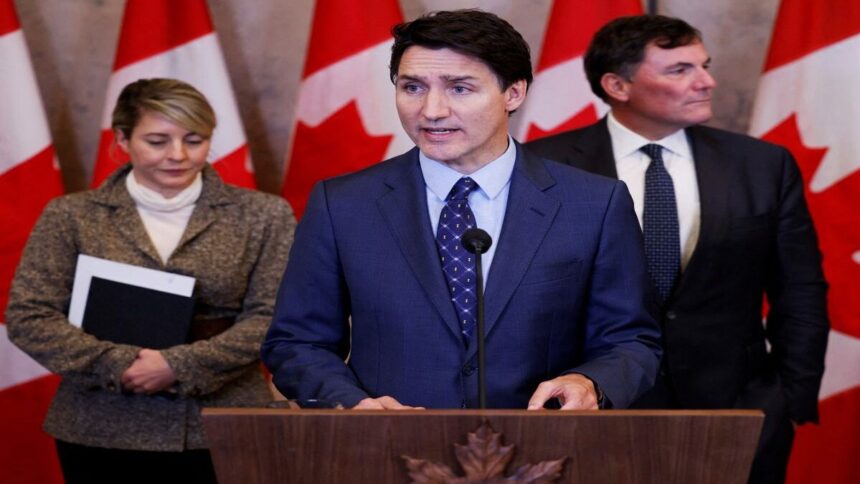The ongoing diplomatic dispute between India and Canada has escalated dramatically, following Canada’s recent designation of India as a “cyber adversary” in its latest National Cyber Threat Assessment report for 2025-2026. This categorization has prompted a strong rebuttal from India, which views the label as part of a broader strategy by the Canadian government to undermine India’s reputation on the global stage.
The Canadian Allegations
In its report, the Canadian government claims that India is developing a modernized Cyber Adversary program with the intent to enhance its national security capabilities, which allegedly includes espionage and counter-terrorism efforts. The report asserts that Indian state-sponsored cyber actors are likely conducting cyber operations against Canadian governmental networks for espionage purposes. Canada has now placed India fifth on its list of cyber threats, following China, Russia, Iran, and North Korea.
The Canadian Centre for Cyber Security, part of the Communications Security Establishment, released this assessment as a part of its ongoing monitoring of cyber threats. Notably, this marks the first time India has been explicitly included in such a list, which previously did not mention India in its assessments from 2018, 2020, and 2023-2024.
The Context of Tensions
This recent development comes in the wake of heightened tensions between the two nations, particularly after Prime Minister Justin Trudeau’s allegations regarding India’s potential involvement in the murder of Hardeep Singh Nijjar, a pro-Khalistan separatist, in British Columbia. Trudeau’s claims, which he stated were backed by credible evidence, have been firmly denied by India, which has described them as baseless.
The tensions have prompted diplomatic measures, including India expelling six Canadian diplomats and recalling its high commissioner from Canada. These actions highlight the deteriorating diplomatic relations that have characterized interactions between the two countries in recent months.
India’s Response
India’s Ministry of External Affairs has reacted vehemently to Canada’s labeling. Spokesperson Randhir Jaiswal condemned the classification as part of a “Canadian strategy to attack and malign India.” He criticized the lack of evidence supporting Canada’s allegations, stating, “As on other occasions, these imputations are made without a shred of evidence.” Jaiswal emphasized that Canadian officials have admitted to efforts aimed at manipulating global opinions against India.
The Indian government has characterized Canada’s allegations as a blatant violation of established diplomatic norms. Jaiswal pointed out that Indian diplomats in Canada have been subjected to intense surveillance and intimidation, which he described as a “flagrant violation of relevant diplomatic and consular conventions.”
Diplomatic Norms and Surveillance
India’s official statements have underscored a growing concern over the treatment of its diplomatic personnel in Canada. Reports indicate that Indian officials have been placed under audio and visual surveillance, with their communications intercepted. Jaiswal stated that such actions by the Canadian government aggravate an already tense situation and are incompatible with established diplomatic practices.
The Indian government’s protests regarding these issues highlight a significant breach of protocol that is typically upheld in international relations. While Canada has portrayed itself as a champion of a “rules-based” international order, India accuses it of hypocrisy, given its disregard for established diplomatic norms in this case.
Implications of the Cyber Threat Assessment
The inclusion of India in the cyber threat report not only intensifies the diplomatic rift but also carries implications for international perceptions and relationships. By categorizing India alongside countries like China and North Korea, Canada risks complicating its bilateral relations with one of the world’s largest democracies and an emerging global power.
The Canadian report suggests that India’s ambitions to elevate its global status involve building capabilities that could pose a threat to Canada. This narrative could influence how other countries view India and its cyber capabilities, potentially isolating India in international forums and discussions.
The recent labeling of India as a “cyber adversary” by Canada marks a significant escalation in the diplomatic tensions that have been brewing between the two nations. India’s strong condemnation of these allegations, combined with its assertions of diplomatic misconduct by Canada, points to a complex and challenging relationship that appears set to endure further strains.
India exposesTrudeau 🔥
"We’ve discovered Canada’s placed Indian diplomats under audio & video SURVEILLANCE"
Trudeau's image. 🤡
India has now summoned Canadian High commissioner over absurd comments on our HM Amit Shah! pic.twitter.com/s50lGychV3
— Ashtalakshmi ( Modi's Family 🇮🇳) (@Ashtalakshmi8) November 2, 2024As both countries navigate these tumultuous waters, the potential for dialogue and resolution seems overshadowed by mutual distrust and accusations. The unfolding events will not only impact India-Canada relations but may also reverberate across the broader geopolitical landscape, influencing global perceptions of both nations.
Read More: Gujarat’s C-295 Facility: A Milestone in India’s Defence Ambitions






